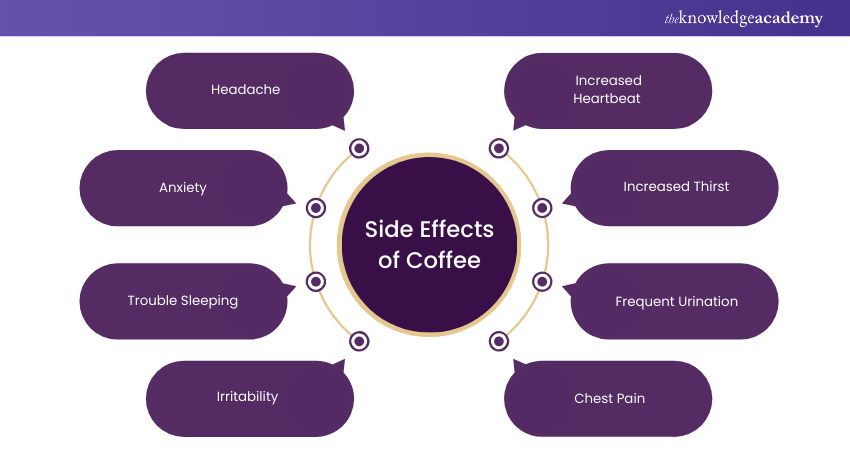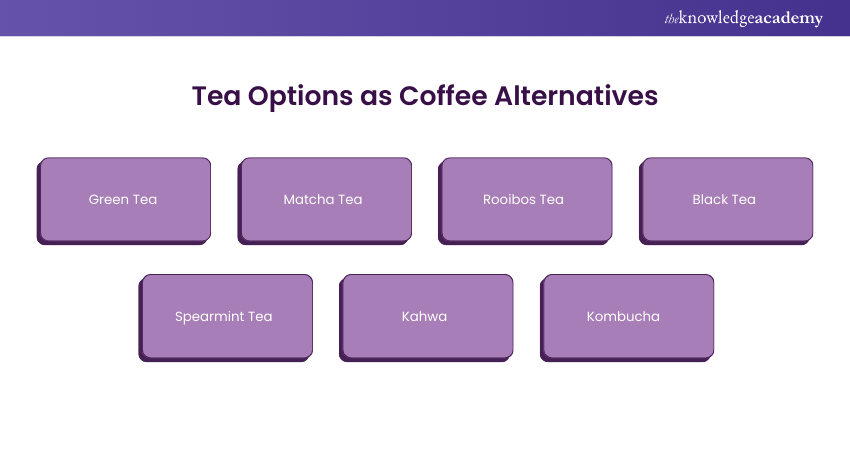We may not have the course you’re looking for. If you enquire or give us a call on +352 8002-6867 and speak to our training experts, we may still be able to help with your training requirements.
Training Outcomes Within Your Budget!
We ensure quality, budget-alignment, and timely delivery by our expert instructors.

The comforting aroma of freshly brewed Coffee—it’s practically a morning ritual for many. But hey, not everyone’s cup of joe is, well, Coffee!
Coffee and other high-caffeine beverages like Red Bull can lead to jitters, headaches, and digestive issues. Did you know that a single serving of Coffee contains about 95mg of caffeine? For some, this high caffeine content can cause nervousness and agitation. Others might dislike the bitter taste of Coffee or simply crave a change in their daily routine.
Now, picture this: you’re sipping on a steaming mug of herbal goodness, and suddenly, the world feels brighter. No jitters, no caffeine-induced rollercoaster—just pure delight. Intrigued? Buckle up, because we’re about to explore a delightful array of Coffee Alternatives that’ll make your taste buds do a happy dance!
Table of Contents
1)What is Coffee?
2) Side Effects of Coffee
3) Coffee Alternatives
a) Tea
b) Apple Cider Vinegar
c) Golden Milk
d) Smoothies
e) Lemonade
f) Caffeine Gum or Pills
g) Ashwagandha
h) Golden Root
i) Beetroot
j) Mushroom
4) Conclusion
What is Coffee?
Most of you might be aware of Coffee as a roasted Coffee bean or Coffee powder (ground Coffee beans). But have you ever wondered about how Coffee is grown?
The Coffee plants can grow over 30 feet, but to preserve the energy of these Coffee plants, they are regularly pruned, which also aids in harvesting. As this plant grows continuously, it is not surprising to see ripe fruit, green fruit, and flowers on a single tree.
The Coffee plants can live up to 100 years, with the most yield expected between the ages of 7 and 20. Based on the variety and proper care, its production can increase over the years mentioned.The commercial Coffee industry has two types of Coffee bean variants or species – Coffee Arabica and Coffee Robusta. It has a rich Caffeine content, tastes bitter and is slightly acidic, stimulating the human body. It can be prepared and served in different ways.
The common ways to prepare Coffee are French press, espresso, caffe latte, or canned Coffee. Usually, milk, sugar, cream or other substitutes are used to cover the bitter taste of the Coffee and enhance its flavour. It has the highest sales in the global market, especially hot drinks.
Side Effects of Coffee
Research has shown that consuming Coffee in low-to-moderate amounts is safer compared to those who take an overdose. The reason is the rich caffeine content in Coffee. Following is a list of some common side effects of too much caffeine consumption:

1) Headache
Caffeine is a common stimulant, found in Coffee and tea, and even used in pain relief medicines like Excedrin. While it can help alleviate headaches, over consumption or withdrawal can cause them. The National Headache Foundation advises moderate use and avoiding daily caffeine if frequent headaches occur.
2) Anxiety
Caffeine can impact mood, with moderate intake boosting happiness but higher amounts (2-6 cups) potentially causing anxiety. Research on caffeine's effect on anxiety shows mixed results, suggesting that individuals who feel anxious after consumption may need to reduce their intake.
3) Trouble Sleeping
Consuming caffeine near to bedtime can disrupt sleep by reducing its quality and making it harder to fall asleep. Regular caffeine users might build a tolerance, but it's still advised to avoid caffeine six hours before bed to prevent sleep disturbances.
4) Irritability
High caffeine intake can lead to irritability, especially in those with psychological or anxiety disorders. If you feel irritable after consuming caffeine, consider cutting back, as sensitivity levels vary.
5) Increased Heartbeat
Caffeine can affect heart rate, with some studies showing changes after four cups of Coffee. Slow metabolizers of caffeine are at higher risk for heart issues. A rapid heartbeat may indicate caffeine sensitivity or other health problems, necessitating a reduction in intake.
6) Increased Thirst
Even low caffeine intake can increase thirst, particularly in casual consumers. High levels of caffeine may also cause thirst, but more research is needed.
7) Frequent Urination
Caffeine acts as a diuretic, increasing urine production and leading to frequent urination. This can result in the loss of important nutrients. Individuals with overactive bladders are more susceptible to this effect.
8) Chest Pain
Excessive caffeine can restrict blood flow to the heart, causing chest pain. While this risk is low for moderate consumers, those with health conditions or caffeine sensitivity may experience chest pain with less than two cups of Coffee. Seek medical help if chest pain occurs after consuming caffeine.
Enhance career opportunities in the hospitality and café industry with our Industry Training now!
Coffee Alternatives
Are you willing to try something new and healthy Alternative to Coffee? Then, the following are some Coffee Alternatives you can try and assess which of these drinks suits your taste and health.
1) Tea
Coffee contains about 95 mg of caffeine per serving, which is higher than most teas. Coffee's caffeine effects are short-lived and can lead to a crash, while tea provides a milder, more sustained effect. Coffee can cause nervousness and dehydration, whereas teas like white and green offer stress reduction and more antioxidants. Tea also has less impact on teeth staining and skin health, and its production has a smaller carbon footprint compared to Coffee. Here are some tea options you can use as a Coffee Alternative.

a) Green Tea
Another great substitution for Coffee is Green Tea. It is among the healthiest products that one can ever take from the market. It strengthens the immune system and provide antioxidant, disease prevention benefits that assist in warding off diseases. It has been proven that drinking green tea can decrease probabilities of heart disease, diabetes type 2 and some types of cancer, including colorectal, stomach, and pancreatic cancers.
b) Matcha Tea
Matcha Tea is created when Matcha, a root plant, is ground into a fine green powder. It has approximately half as much caffeine as a cup of Coffee, an excellent energy booster source and a bodily detoxifier. After drinking a cup of Matcha Tea, many have reported a more relaxed feeling, as it also improves and uplifts the mood. You will also get great glowing skin that is healthy and radiant.
c) Rooibos Tea
Rooibos Tea, often known as Red Rea, is a caffeine-free beverage with South African roots that makes a wonderful alternative to ordinary Coffee. Rooibos has a pleasant, fruity flavour and healthy antioxidant levels, in contrast to other types of Tea.
d) Black Tea
Black Tea, also known as Sulaimani Tea, is a spiced tea without milk. The name Sulaimani Tea comes from the city of Iraq. And the origin of Black Tea is said to be China. This Tea is brewed with cloves, cinnamon, cardamom, Tea powder, ginger, and a dash of mint leaves and lemon with sugar or honey for taste.
The ingredients can vary based on the region, who is brewing it, and the required taste. Drinking this antioxidant-rich Tea can offer numerous benefits, such as improving brain functions, reducing the risk of cancer, weight loss, increasing immunity and more.
e) Spearmint Tea
Spearmint is a type of mint plant. It can be dried and steeped to make caffeine-free tea or used as an extract in foods and drinks. It contains potent phenolic compounds that enhance concentration, support short-term and working memory, and promote neuroprotective and anti-inflammatory responses.
f) Kahwa
Kahwa is a type of Tea which dates back to the Kushan period, as per popular belief. The Kahwa drink is served hot in Kashmiri households for its numerous benefits.
This soul-warming drink (Kahwa) from the Himalayan valley resonates with the potential of Indian spices. Kashmiri Kahwa is usually prepared with green Tea leaves (optional), saffron, cinnamon, rose petals, cardamom, crushed walnuts and almonds. All these ingredients mentioned are boiled in water with the required sugar or honey added to serve.
g) Kombucha
Kombucha is a fermented tea drink that may benefit gut health. Its caffeine content is generally low, making it suitable for those sensitive to caffeine. However, more human clinical trials are needed to confirm its health benefits. Note that kombucha contains trace amounts of alcohol.
2) Apple Cider Vinegar
Apple Cider Vinegar (ACV) has numerous health advantages and can be a great substitute for Coffee. You will get an energy boost from it, and it also helps with weight loss, inflammation reduction, and diabetes prevention. ACV can damage your teeth if you consume it directly due to its high acidity. Hence, you must dilute it with water before drinking it to enjoy its benefits.
3) Golden Milk
Golden Milk, also known as Haldi (Turmeric) Milk, is a traditional Indian beverage and a great supplement to Coffee. Golden Milk is usually consumed at night, sometimes before sleeping. Turmeric is the key ingredient for this majestic, non-caffeinated drink.
Golden Milk is filled with excellent anti-inflammatory and antioxidant properties. It will boost your strength, reduce the risk of cardiovascular ailments, protect against cancer, and improve your mental health. It can also play a key role in enhancing your sleep pattern.
4) Smoothies
Smoothies are an excellent alternative to Coffee, as they combine a list of natural fruits and vegetables that are rich in nutrients and delicious to consume. The nutrients, minerals, fibre, carbohydrates, antioxidants and proteins present in this set of ingredients serve as a great source of energy boosters essential for the body's smooth functioning.
5) Lemonade
This decaffeinated regular Coffee Alternative can keep you alert and active throughout the day. It is not at all like the beverages high in caffeine, whose effects wear off with time. Vitamin C found in lemon water can strengthen your immune system and shield your skin from damage caused by UV rays.
6) Caffeine Gum or Pills
Caffeine gum or pills are practical alternatives to Coffee for on-the-go energy. A 50-milligram piece of caffeine gum can boost alertness similarly to a cup of Coffee. Be mindful of the caffeine content per piece, as it varies by brand.
7) Ashwagandha
Ashwagandha is a medicinal herb that may improve focus and memory. Consumed as tea or supplements, it addresses the root cause of fatigue, unlike Coffee, which merely provides temporary energy.
Understand the art of colour coordination with our Floristry Introduction Course today!
8) Golden Root (Rhodiola Rosea)
Rhodiola, or golden root, is an adaptogenic herb that helps the body adapt to stress. Limited evidence suggests it may improve mood, concentration, and fatigue. More studies are needed to confirm these benefits.
9) Beetroot
Beetroot is rich in nitrates, which enhance blood flow to the brain and may improve cognitive performance. Consuming three to five beets, either in smoothies or juice, can provide an effective dose of nitrates as a Coffee Alternative.
10) Mushrooms
Medicinal mushrooms like lion’s mane and cordyceps, often found in supplements or mushroom Coffee, help the body adapt to stress. While more research is needed on their benefits, mushroom Coffee, which contains little to no caffeine, can be a good alternative for heavy Coffee drinkers.
11) Mixed-berry Smoothie
Dark-coloured berries such as strawberries, blueberries, blackberries, and raspberries contain flavonoids that can reduce fatigue. A small study showed that a mixed-berry smoothie improved cognitive function, attention, and task-switching abilities in healthy young adults.
12) Schisandra
Schisandra, a red-berried herb used in traditional Chinese medicine, may enhance mental performance and reduce fatigue. Available in supplements and powdered form, more research is needed to confirm its health benefits as an adaptogen and Coffee Alternative.
13) Breadnut
Breadnut, also known as ramon or capomo, is a tropical plant whose seeds can be roasted and brewed like Coffee but without caffeine. It is rich in mood-boosting amino acids like tryptophan, which is both energizing and relaxing.
14) Cocoa Beans
Cocoa beans, the seeds of the cacao tree fruit, can be used to make hot chocolate with non-alkalized cocoa powder, which contains health-promoting flavanols. Studies show that regular intake of high-flavanol cocoa drinks can improve memory and cognitive function in older adults.
15) Date Seeds
Date seeds from the dried fruit of the date palm can be roasted and brewed as a Coffee Alternative. They offer a similar flavour and are rich in antioxidants, as evidenced by studies highlighting their potential health benefits.
Get expertise in cost-effective maintenance with our Facilities Management Training – Sign up today!
Conclusion
Monotonously drinking the same cup of Coffee might lead to boredom and increase the risk of caffeine overdose. Therefore, this blog will surely help those willing to try some new varieties of drinks as a Coffee Alternative. Exploring these options can refresh your daily routine and offer various health benefits.
If you are interested in becoming a professional Barista, you can register with the Basic Barista Course now!
Frequently Asked Questions

A good Coffee Alternative for an empty stomach is warm lemon water. It is gentle on the digestive system, helps kickstart metabolism, and provides a dose of vitamin C. Additionally, it aids in hydration without the acidity and caffeine of Coffee, making it a soothing and refreshing start to the day.

Ginger tea is an excellent Coffee Alternative for bloating. It has natural anti-inflammatory properties that can help soothe the digestive system and reduce bloating. Ginger aids in digestion relieves gas, and promotes a calm stomach, making it a beneficial choice for those prone to bloating.

The Knowledge Academy takes global learning to new heights, offering over 30,000 online courses across 490+ locations in 220 countries. This expansive reach ensures accessibility and convenience for learners worldwide.
Alongside our diverse Online Course Catalogue, encompassing 17 major categories, we go the extra mile by providing a plethora of free educational Online Resources like News updates, Blogs, videos, webinars, and interview questions. Tailoring learning experiences further, professionals can maximise value with customisable Course Bundles of TKA.

The Knowledge Academy’s Knowledge Pass, a prepaid voucher, adds another layer of flexibility, allowing course bookings over a 12-month period. Join us on a journey where education knows no bounds.

The Knowledge Academy offers various Industry Courses, including a Basic Barista Course, Facilitation Skills Training, and Floristry Introduction. These courses cater to different skill levels, providing comprehensive insights into Health Benefits of Drinking Black Coffee.
Our Business Skills Blogs cover a range of topics related to Coffee, offering valuable resources, best practices, and industry insights. Whether you are a beginner or looking to advance your skills as a Barista, The Knowledge Academy's diverse courses and informative blogs have you covered.
Upcoming Business Skills Resources Batches & Dates
Date
 Basic Barista Course
Basic Barista Course
Fri 21st Feb 2025
Fri 25th Apr 2025
Fri 20th Jun 2025
Fri 29th Aug 2025
Fri 31st Oct 2025
Fri 19th Dec 2025







 Top Rated Course
Top Rated Course



 If you wish to make any changes to your course, please
If you wish to make any changes to your course, please


